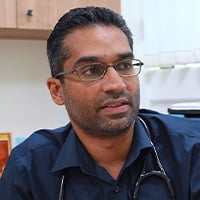
PETALING JAYA: Do you frequently get heart palpitations, or feel a rapid fluttering in your chest? Have you experienced accompanying dizziness, shortness of breath, or giddiness? If you have, it’s best to visit your doctor, as you might be suffering from heart arrhythmia.
An arrhythmia is a problem with the rate or rhythm of one’s heartbeat: it’s too slow, too quick, or has an irregular rhythm. This condition is strongly associated with cardiovascular diseases such as coronary artery disease, valvular heart disease, and heart failure.
Left untreated, arrhythmia could lead to serious health consequences.
Heart disease continues to be the No. 1 cause of death in Malaysia: in 2020, it accounted for 17% of medically verified deaths nationwide. Notably, arrhythmia was a common contributor to this statistic.
Indeed, cases of atrial fibrillation, the most common kind of arrhythmia, have been increasing worldwide, with the Asia Pacific Heart Rhythm Society reporting a global prevalence of 46.3 million sufferers last year.
In conjunction with World Heart Day today, FMT Lifestyle spoke with two doctors on the ins and outs of arrhythmia.
Subang Jaya Medical Centre (SJMC) consultant cardiologist Dr Navin Sukilan said in the past few years, there has been an exponential increase in the number of cardiovascular patients, as well as a rise in co-morbidities – that is, people who suffer from more than one health condition at the same time.
“These are issues connected with a more affluent society,” he said. “As we move towards being a developed nation, people are eating more unhealthily and chasing higher productivity, which leads to high stress levels and lack of exercise.

“These, in turn, lead to things like diabetes and high blood pressure, which increase the incidence of heart disease.”
Arrhthymia, he said, is a serious issue as it is strongly connected to heart failure and increases the chances of stroke – two major problems in modern Malaysian society.
According to him, the groups most susceptible to arrhythmia are those who are obese, who suffer from high blood pressure or diabetes, or have a family history of heart problems.
Those aged 65 and over are also more at risk, as well as individuals with certain medical conditions such as hyperthyroidism.
Nevertheless, even if you don’t fall into the above groups, it’s important to regularly check your heart health.
“Some young people don’t believe they can have heart rhythm problems. This is not entirely true, as there are certain conditions, such as supraventricular tachycardia, that can present at a younger age, even in your 20s,” Navin pointed out.

“Others, when they feel their heart fluttering, may chalk it up to stress, anxiety, or even a panic attack. I would tell these people to visit a doctor to rule out other serious issues first.”
On a brighter note, he said more and more people are aware of such health issues these days, thanks to modern technology. “We’ve had patiences whose smartwatches detected problems with their heartbeats, so they came to us for health checks.”
Preventive measures and treatment
Navin’s colleague, consultant cardiologist and electrophysiologist Dr Koh Kok Wei, shared that in older individuals, coronary disease is one of the main causes of arrhythmia.
As such, early detection and effective management of risk factors such as hypertension, diabetes, or hyperlipidemia – elevated lipids or fats such as cholesterol in the blood – is crucial.
Further preventive measures include maintaining an ideal body weight and avoiding alcohol, especially among younger people, he added.
When it comes to treatment of arrhythmia, common methods include medication, or the implantation of devices such as cardioverter defibrillators or pacemakers to regulate heart rhythms.

Certain cases could also be treated through catheter ablation, where radiofrequency energy is utilised to destroy small areas of heart tissue that cause rapid and irregular heartbeats.
This procedure, carried out by an electrophysiologist, is considered highly effective and minimally invasive for those who suffer from arrhythmia.
Koh noted that the cost of arrhythmia treatment varies depending on the stage and severity of a patient’s condition. Some cases, he said, might not require immediate intervention, while others may require more complex and costly procedures.
Thankfully, as arrhythmia is often acquired – as opposed to being a condition present from birth – many treatments are covered by insurance policies.
“Most arrhythmia cases can be cured if diagnosed and treated early. Delaying treatment may lead to disease progression, incurring higher costs and long-term health expenses,” Koh concluded.


